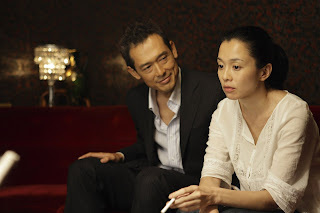
Nonko is Kazuyoshi's third film and also his third film at the filmfestival in Rotterdam. His first film was in the tiger competition a few years ago. Since then he's come to Rotterdam every few years. In Japanese there is a special word for an unemployed woman, who helps her parents and stays at home. It's called a ''kajitetsudai''. The lead in Nonko; Nonko, is one of them. She had a short television career and divorced her husband some years back.
One day an ambitious boy shows up who wants a market spot at the local festival that is soon to take place. Nonko is to direct him to the one in charge of the market spots. The man rejects the boy's wish but he doesn't give up, he is an optimistic kind of person. Nonko offers him a place to stay at her parents' place which leads to many conflicts in and around the house, and later even at the festival.
The title suggests a social comment because Nonko's age and the word Kajitetsudai are in it. In the west a 36 year old woman is not considered that old. But in a country where women settle down before they're 30, it is. These 36 year old, single women, like Nonko are miserable, or so most people think in Japan. But Kazuyoshi does not make a feminist film, he decides to portray one of these women.
But Nonko is not the only outcast in the film. In a society where university degrees choose where they will work even before graduating, and more than half will work in the same company for the rest of their lives, the dreamy, optimistic Masaru is an outcast too. He wants to become a merchant and travel around the world. While Nonko becomes more optimistic during the film, Masaru has his dreams shattered, which leads to a big climax at the end.
While Kazuyoshi went for a more serious approach than with the comedies he made before, there is still a good dose of humor in Nonko. It works because the main characters are convincing. And more important, they are real. A growing population of women in Japan is like Nonko, and many of them will identify with her. Nonko is a subtle plead for the kajitetsudai of Japan. A chance to empathise with them. For the western viewers, the title is just ''Nonko''. This way the film contains less social commentary but makes it more accessible for the western viewer.
**** (out of 5)
Geen opmerkingen:
Een reactie posten